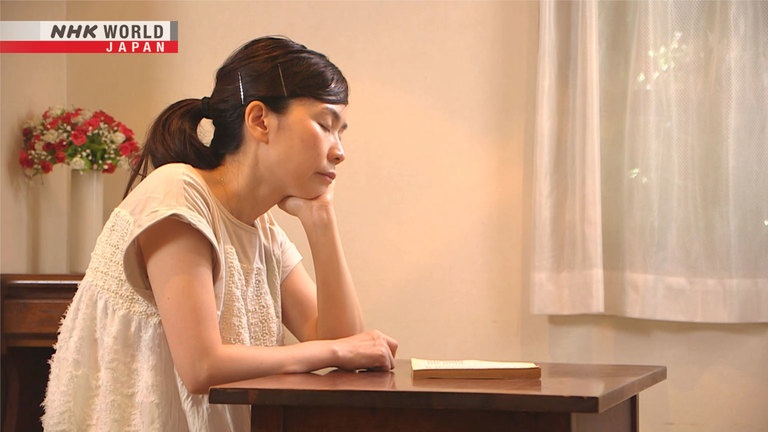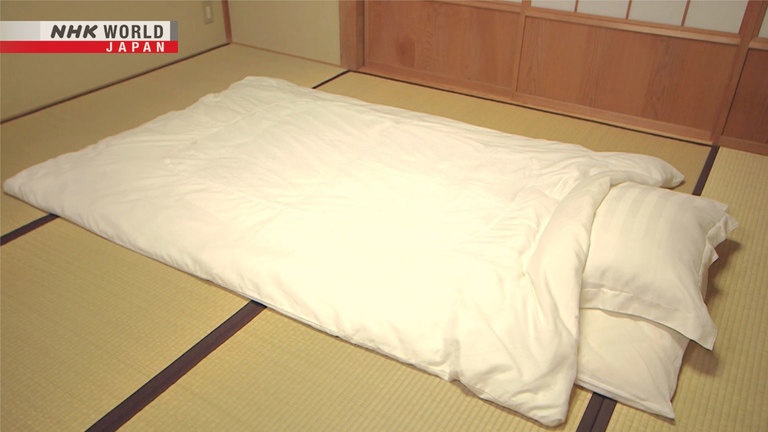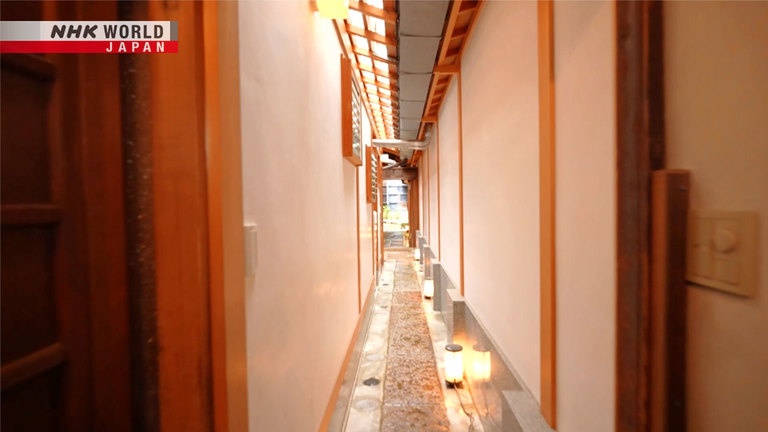Sleep
The Japanese language is rich in words and expressions influenced by nature, history and culture. This episode features words related to neru, meaning "to sleep." Some data show that Japanese people average around only 7 hours of sleep a day, suggesting that many need more slumber. In fact, the Japanese language has a number of unique words related to sleep that describe various aspects of daily life. From his home in Kyoto Prefecture, poet and literary translator Peter MacMillan guides us through these expressions and the culture behind them.




Transcript
"Yukigesho."
"Karakurenai."
The Japanese language is rich in unique expressions that reflect nature and culture.
Magical Japanese.
Today's theme is "neru," meaning "to sleep."
Getting enough sleep is essential for mental and physical health.
Some data show that Japanese people average around only 7 hours of sleep a day, suggesting that many need more slumber.
In fact, the Japanese language has many words related to sleep.
Excuse me! I must have dozed off.
I had a late night at the office yesterday.
Ah! And I know just the right expression for this situation.
"utatane."
"Utata" is related to "uto uto," an onomatopoeia used to describe someone who's dozed off.
"Ne" is the noun form of "neru."
"Utatane" means dozing off when you didn't mean to.
"utatane."
However, it's believed that in the Heian period, use of the word was limited to when someone fell asleep while thinking about love.
The word "utatane" appears in a "waka" poem by Ono no komachi, one of the leading poets of the Heian Period.
Take a nap,
look at the person you miss
It's the first time I've asked for a dream.
The poem describes someone who pines for her beloved.
She dozes off, and sees him in a dream.
After that, all she can think about is that dream.
You get a good sense of how badly she longs to see her beloved,
in the way she yearns for the brief glimpse, that she got while nodding off.
But if you're tired, a short nap will not suffice.
You need to get some proper sleep in a suitable place.
"nedoko."
"Doko" means "floor."
"Nedoko" refers to a "futon," which is a traditional Japanese mattress, or more generally, a space for sleeping.
Before Western beds were introduced, people in Japan commonly slept on a "futon" laid out on the floor.
Even today, many people use a "futon" instead of a bed.
"Futon" are folded, and put away every morning.
You can also combine "nedoko" with a certain creature, to create another expression.
"unagi no nedoko."
"Unagi" means "eel."
The phrase literally means "eel's bed," but it's used in reference to something else.
An "unagi no nedoko" is a building with a narrow frontage and a long depth,
like this.
This "unagi no nedoko" is only 8 meters wide.
They were traditionally the houses of merchants, with a shop facing onto the street,
and living space further inside.
Many "unagi no nedoko" houses were built around the end of the 16th century.
Eels like to live in long, narrow spaces, just like this house, giving this architectural style its name.
By the way, this house is five times as deep as it is wide: 40 meters deep, in fact!
"Unagi no nedoko" isn't the only phrase that combines animals with sleeping.
"tanuikineiri."
A "tanuki" is a raccoon dog, and "neiri" means "to enter a deep sleep."
"Tanuki" are said to be very sensitive, and are even known to briefly lose consciousness when taken by surprise,
making them look like they've fallen asleep.
And in ancient Japan, "tanuki" were believed to trick humans.
From this, "tanukineiri," or "sleeping like a tanuki," came to mean pretending to be asleep.
Our daughter says she wants to take ballet lessons.
But it'll cost a fortune! Do you think we can afford it?
Don't "tanukineiri!"
—pretend to be asleep.
"tanukineiri."
A sleeping person is completely defenseless, so this next phrase sounds dreadful.
I really wouldn't want it to happen to me!
"nemimi ni mizu."
"Mimi" means "ear," and "mizu" is "water."
"Nemimi ni mizu" refers to a complete surprise,
much as if you suddenly got water in your ears while asleep, or heard voices warning of a flood when snoozing.
How is your daughter doing? She must have grown.
Yes, she was into ballet.
But the other day she told me she wants to be a
punk rock musician. It was "nemimi ni mizu!"
-a total surprise.
"nemimi ni mizu."
When you're asleep, you're unconscious.
Whatever happens, you cannot do anything about it.
That insight may have inspired the following Japanese idiom.
"kaho wa nete mate."
"Kaho" is "good news," and "mate" is the imperative form of "matsu," or "to wait."
The phrase means, "to receive good news, sleep and wait."
It reflects the view that truly good things cannot be planned or controlled.
The best thing to do is to let go and wait for them to come to you.
Now, when you do go to sleep, it is essential to have a good... pillow!
And there are many Japanese expressions related to pillows.
"kita makura."
"Kita" is "north," and "makura" means "pillow."
In Japan, "kitamakura," or sleeping with your head northward, is believed to bring misfortune, and is generally avoided.
This is because at funerals, the body of the deceased is often positioned in that direction.
The custom is said to have come from the way Buddha died, with his head facing northward.
It might be interesting to check the layout of the beds in homes and hotels, when you visit Japan.
"hizamakura"
"Hizamakura" literally means sleeping with your head on someone's "hiza," or "knee."
It actually means sleeping with your head on someone's lap.
How peaceful!
"makura o takaku shite neru."
"Takaku shite" means "to raise."
The phrase literally means to sleep with your pillow raised, and describes sleeping without any worries.
This expression is said to have come from the custom of raising one's pillow, when it's hard to sleep.
It was said that this reduced the blood flow to the head, making it easier to doze off.
Sir, the bank has agreed to a loan!
That's great news! We avoided bankcruptcy.
I can "makura o takaku shite neru."
—sleep at ease.
So, what did you think?
I hope you can use these Japanese phrases in your own conversations.
Now, if you'll excuse me, I would like to get to bed early tonight.
Oh, just a moment.
Hello?
What!?
Oh, that's "nemimi ni mizu," a complete surprise!
Yes. Sorry?